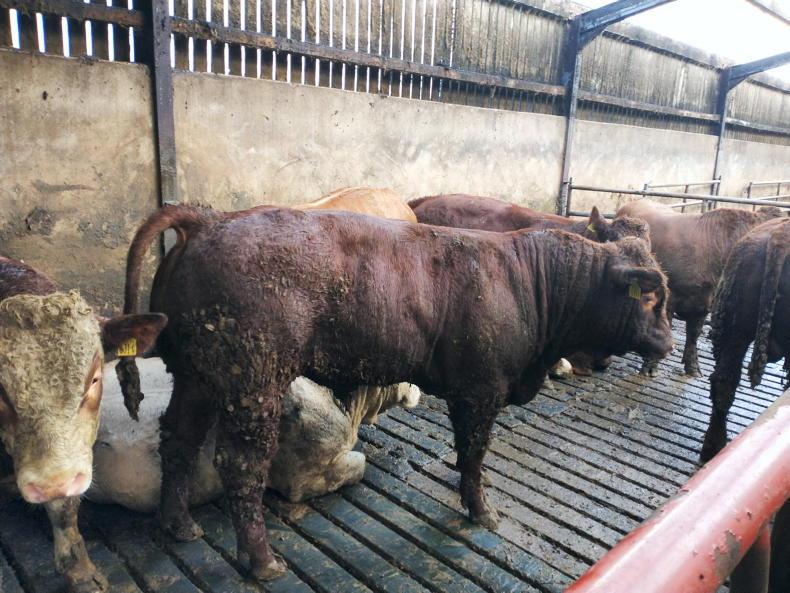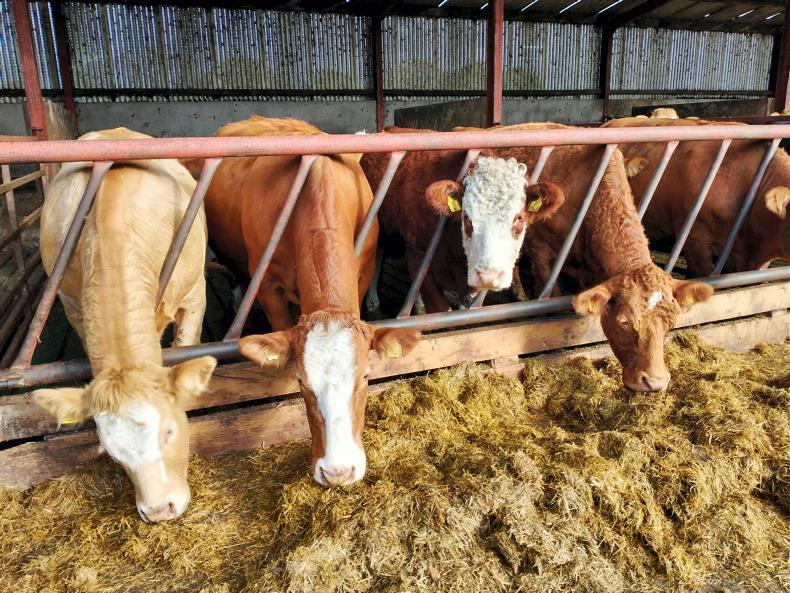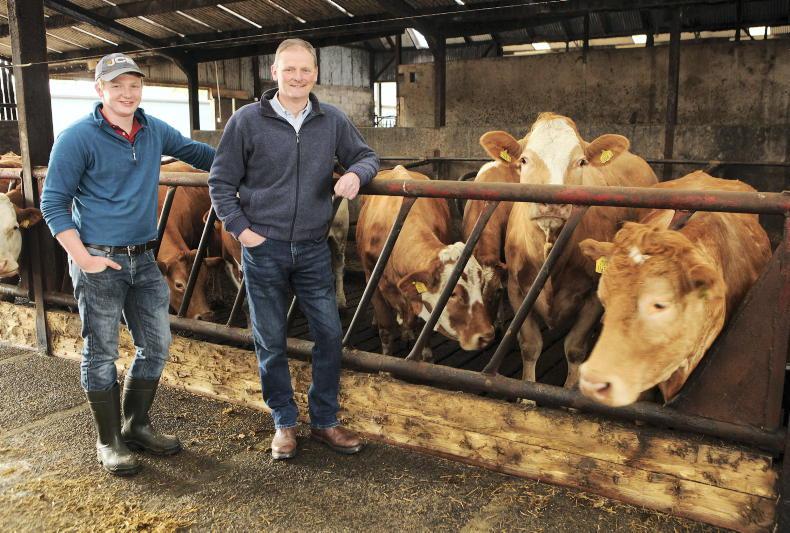Anyone who tries to hold down full-time employment while at the same time operating a farm business will understand the frustration expressed by David Brown that he rarely is able to get through the list of jobs left to a Saturday.
Since taking over as Ulster Farmers’ Union (UFU) president in early May 2022, David has had limited time at home, with meetings in London or Brussels, or further afield – a couple of weeks ago, he spent five nights in Croatia at the Copa-Cogeca congress.
Outside of that, the day-to-day business of the UFU often sees him away from the farm, attending meetings, dinners and events across NI. Leading a farm organisation might carry prestige and bring a lot of job satisfaction, but it also involves long hours and plenty of challenges.
At home, David farms outside Florencecourt in Co Fermanagh with his wife Mary and son Neil, who has recently taken up a post as a sales manager for De Laval.

Autumn-born bulls have been housed since 1 September.
The main enterprise on the farm is a 70-cow suckler herd, with calves taken through to beef. Some store lambs are also bought each autumn and finished off grass.
“Between us, we are holding it together. Saturday is looked forward to as we try to catch up with the work,” said David, who hosted a visit by agricultural journalists to the farm last Friday.
Before ever taking a position on the UFU presidential team, David was well known in Fermanagh for operating a well-run farming business. He was among the first group of host farmers taking part in the Focus Farm Programme and also served as chair of Fermanagh Grassland Club.
With his brother Ian on the home farm, David moved to set up a business on an out-farm in 1993. At the time, his father was a regular attendee at local marts, buying store cattle and taking them to finish, as well as keeping breeding sheep.

First-cut from 2021 is currently being fed to suckler cows.
“I didn’t have the love for going to marts that my father had,” admits David. Instead, he decided to establish a suckler herd around the time quotas were introduced, buying a “dolly mixture” of 40 cows from around the marts.
Over the years, he has concentrated on breeding his own Simmental x Limousin cows, with AI used for replacements and a Charolais stock bull to sweep up.
The Charolais heifers are taken through to finish, but the preference is to sell them live in the mart. If the farm is under TB restriction, plan B is to go to the factory.
“In the last 15 years, we have been closed every third year and we are constantly testing. If I’m not down, the neighbours are down. There is a circle of TB in this area now,” says David.
Young bulls
That experience with TB also brought a move away from producing forward steers to taking all male calves through as young bulls.
“Having TB forced me to look at young bulls because I had less flexibility around when I sell. But having done it, I discovered how extremely efficient these animals are at converting feed into beef,” says David.
The aim is to finish bulls at 400kg carcase weight at 14 to 15 months. The best silage on the farm is targeted at finishing cattle and the bulls are not fed ad-lib concentrate at any stage.
Spring-born bulls are still on the cow and will be weaned around Christmas. They are currently on 1kg and will move onto 2kg and then up to 4kg by weaning. They will get 6kg in March and April and go to 8kg in May and June.
Autumn-born bulls go out with cows in the spring and are then weaned and rotationally grazed over the summer, with no meal fed. They are housed around 1 September and built up to 8kg per head over the next few weeks.
From birth to slaughter, bulls are averaging 1.45kg of liveweight gain per day and in the finishing period, this can be as high as 2kg per day.
“The best thing I ever did was buy a weighbridge in 2009,” reckons David. All bulls are sold to ABP Newry.
Land purchase
Having started out with 100ac, over the years David managed to buy three 20ac parcels, taking the farm to 160ac. Another two parcels, totalling 40ac, were purchased this spring.
Much of the land has been drained, whether using conventional drains or gravel tunnels.
“It has taken my career to-date to get from 100ac to 200ac and it will certainly take my career in farming to pay for it,” says David.
Decision to be made on future genetics
A Simmental x Limousin suckler cow combines milking ability with conformation, but like any continental cow, there is the danger that the Browns will end up with a herd of heavy cows, not well suited to the west.
To try to avoid that, all heifers are calved in at two years and any heifers that have a high weight for their age are not bred. Suitable heifers are artificially inseminated, mainly to an easy-calving Limousin sire, with some Salers also used.
AI sires used across mature cows in 2022 include the Simmental bulls, Omorga Isaac and Shacon Hannibal, and the Limousin bull Claragh Neymar.

Sim x Lim cross spring-calving cows on the Brown farm.
After three weeks of AI to breed replacements, a Charolais stock bull has been used to sweep up, however the bull has been sold and a decision is yet to be made on what to do next.
Autumn-calving cows are bred from 1 November to 24 December, and with cows inside and both David and Neil AI trained, there is limited justification in buying a bull. However, inseminating spring calvers at grass is more difficult, especially with labour a limiting factor at present.
“We might go to a Simmental bull – Neil is keen on the idea of selling surplus heifers,” suggests David.
Always a surplus of silage
An often quoted saying in Fermanagh is that you are only ever a wet week away from housing, so farmers in the area will nearly always carry a surplus of silage forward each year.
“We always want to have half a silo left over – which is two months of silage left,” says David.
The Browns are no different to most other farmers, with first-cut in 2022 delayed due to wet weather in the second half of May, meaning an ME of 10.8MJ/kg DM is lower than in previous years.
The second cut has an ME of 11.3, with some third-cut made as round bales.
Read more
New UFU president putting ‘the land first’
Farmers urged to commit to TB cull
Anyone who tries to hold down full-time employment while at the same time operating a farm business will understand the frustration expressed by David Brown that he rarely is able to get through the list of jobs left to a Saturday.
Since taking over as Ulster Farmers’ Union (UFU) president in early May 2022, David has had limited time at home, with meetings in London or Brussels, or further afield – a couple of weeks ago, he spent five nights in Croatia at the Copa-Cogeca congress.
Outside of that, the day-to-day business of the UFU often sees him away from the farm, attending meetings, dinners and events across NI. Leading a farm organisation might carry prestige and bring a lot of job satisfaction, but it also involves long hours and plenty of challenges.
At home, David farms outside Florencecourt in Co Fermanagh with his wife Mary and son Neil, who has recently taken up a post as a sales manager for De Laval.

Autumn-born bulls have been housed since 1 September.
The main enterprise on the farm is a 70-cow suckler herd, with calves taken through to beef. Some store lambs are also bought each autumn and finished off grass.
“Between us, we are holding it together. Saturday is looked forward to as we try to catch up with the work,” said David, who hosted a visit by agricultural journalists to the farm last Friday.
Before ever taking a position on the UFU presidential team, David was well known in Fermanagh for operating a well-run farming business. He was among the first group of host farmers taking part in the Focus Farm Programme and also served as chair of Fermanagh Grassland Club.
With his brother Ian on the home farm, David moved to set up a business on an out-farm in 1993. At the time, his father was a regular attendee at local marts, buying store cattle and taking them to finish, as well as keeping breeding sheep.

First-cut from 2021 is currently being fed to suckler cows.
“I didn’t have the love for going to marts that my father had,” admits David. Instead, he decided to establish a suckler herd around the time quotas were introduced, buying a “dolly mixture” of 40 cows from around the marts.
Over the years, he has concentrated on breeding his own Simmental x Limousin cows, with AI used for replacements and a Charolais stock bull to sweep up.
The Charolais heifers are taken through to finish, but the preference is to sell them live in the mart. If the farm is under TB restriction, plan B is to go to the factory.
“In the last 15 years, we have been closed every third year and we are constantly testing. If I’m not down, the neighbours are down. There is a circle of TB in this area now,” says David.
Young bulls
That experience with TB also brought a move away from producing forward steers to taking all male calves through as young bulls.
“Having TB forced me to look at young bulls because I had less flexibility around when I sell. But having done it, I discovered how extremely efficient these animals are at converting feed into beef,” says David.
The aim is to finish bulls at 400kg carcase weight at 14 to 15 months. The best silage on the farm is targeted at finishing cattle and the bulls are not fed ad-lib concentrate at any stage.
Spring-born bulls are still on the cow and will be weaned around Christmas. They are currently on 1kg and will move onto 2kg and then up to 4kg by weaning. They will get 6kg in March and April and go to 8kg in May and June.
Autumn-born bulls go out with cows in the spring and are then weaned and rotationally grazed over the summer, with no meal fed. They are housed around 1 September and built up to 8kg per head over the next few weeks.
From birth to slaughter, bulls are averaging 1.45kg of liveweight gain per day and in the finishing period, this can be as high as 2kg per day.
“The best thing I ever did was buy a weighbridge in 2009,” reckons David. All bulls are sold to ABP Newry.
Land purchase
Having started out with 100ac, over the years David managed to buy three 20ac parcels, taking the farm to 160ac. Another two parcels, totalling 40ac, were purchased this spring.
Much of the land has been drained, whether using conventional drains or gravel tunnels.
“It has taken my career to-date to get from 100ac to 200ac and it will certainly take my career in farming to pay for it,” says David.
Decision to be made on future genetics
A Simmental x Limousin suckler cow combines milking ability with conformation, but like any continental cow, there is the danger that the Browns will end up with a herd of heavy cows, not well suited to the west.
To try to avoid that, all heifers are calved in at two years and any heifers that have a high weight for their age are not bred. Suitable heifers are artificially inseminated, mainly to an easy-calving Limousin sire, with some Salers also used.
AI sires used across mature cows in 2022 include the Simmental bulls, Omorga Isaac and Shacon Hannibal, and the Limousin bull Claragh Neymar.

Sim x Lim cross spring-calving cows on the Brown farm.
After three weeks of AI to breed replacements, a Charolais stock bull has been used to sweep up, however the bull has been sold and a decision is yet to be made on what to do next.
Autumn-calving cows are bred from 1 November to 24 December, and with cows inside and both David and Neil AI trained, there is limited justification in buying a bull. However, inseminating spring calvers at grass is more difficult, especially with labour a limiting factor at present.
“We might go to a Simmental bull – Neil is keen on the idea of selling surplus heifers,” suggests David.
Always a surplus of silage
An often quoted saying in Fermanagh is that you are only ever a wet week away from housing, so farmers in the area will nearly always carry a surplus of silage forward each year.
“We always want to have half a silo left over – which is two months of silage left,” says David.
The Browns are no different to most other farmers, with first-cut in 2022 delayed due to wet weather in the second half of May, meaning an ME of 10.8MJ/kg DM is lower than in previous years.
The second cut has an ME of 11.3, with some third-cut made as round bales.
Read more
New UFU president putting ‘the land first’
Farmers urged to commit to TB cull









 This is a subscriber-only article
This is a subscriber-only article











SHARING OPTIONS: